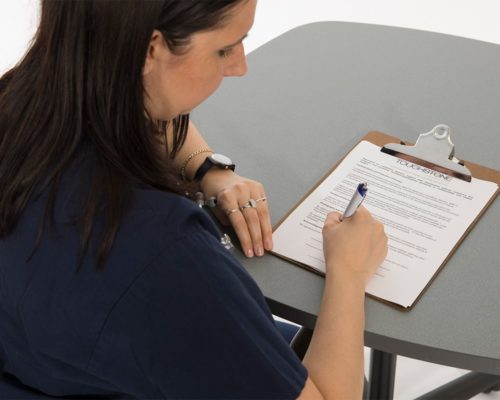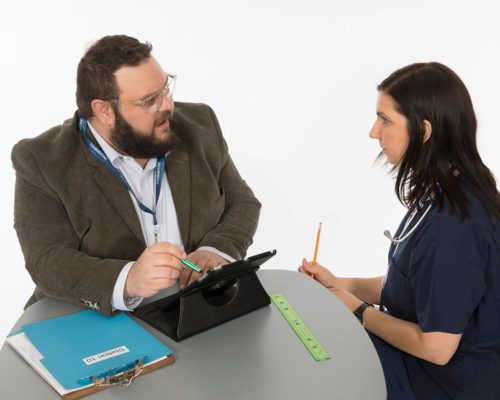ASSESSMENTS
Registered Nurses of Canada Competency Assessment Program (RNCCAP) - Alberta Registered Nurses Assessment Program (ARNAP)
About
Touchstone Institute is modernizing its nursing exams to better serve nursing regulators and their applicants. The Alberta Registered Nurses Assessment Program (ARNAP) is now being administered as the Registered Nurses Canadian Competency Assessment Program (RNCCAP). Previously ARNAP was comprised of two exam sections: an Objective Structured Clinical Examination (OSCE) and a multiple-choice question exam (MCQ). One of the improvements made to the exam is that there will no longer be an MCQ component.
The RNCCAP is a revised and updated version of the ARNAP and is based on the most recent national entry-to-practice Registered Nurse competencies. During this re-branding period we are using the combined acronym RNCCAP – ARNAP.
RNCCAP – ARNAP is a standardized examination that tests the knowledge, skill and judgement of internationally educated nurses (IENs) seeking nursing registration in Alberta. The program was developed by Touchstone Institute in consultation with the College of Registered Nurses of Alberta (CRNA).
The RNCCAP – ARNAP has recently transitioned to a self-referral model. Applicants can now independently register and complete the exam without requiring a referral from CRNA. Applicants who have previously been referred to the exam by the CRNA do not need to self-refer.
Exam Registration
See "Future Exam Dates" below.
In-person OSCE Location:
To be announced
Virtual OSCE location: Conducted online using the Zoom Platform.
Touchstone Institute will refer to all individuals challenging an exam as examinees. In some virtual experiences, the term candidate may be used interchangeably with examinee.
Future Exam Dates
RNCCAP-ARNAP Virtual & In-Person OSCE Dates
Touchstone Institute reserves the right to cancel scheduled exams if the minimum number of registrants is not met. Those registered for cancelled exams will be notified by email and moved to the next available date or provided a full refund.
November 4, 2024
Virtual OSCE Exam - Registration Opens
January 3, 2025
Virtual OSCE Exam - Registration Closes
February 21, 2025
Virtual OSCE Exam Date

Registration
Registration
Registration for the RNCCAP – ARNAP is now available for any individual seeking to demonstrate equivalence to Canadian standards as part of their journey towards RN licensure in Alberta.
If you are interested in self-referring to take the RNCCAP – ARNAP, please email us at exams@tsin.ca with the subject line “Self-Referral to RNCCAP – ARNAP.” You will receive an email back with further instructions to complete registration.
Before you register for the RNCCAP – ARNAP, please ensure you understand how the exam results contribute in your pathway towards licensure. If unsure, please contact your profession's regulatory authority.
For additional information on the RNCCAP – ARNAP requirement, please contact the College of Registered Nurses of Alberta.
Request Letter of Participation
Touchstone Institute does not assist with the Visa application process; this is the responsibility of the examinee. However, if you wish to proceed with the In person OSCE administration, once you have registered and paid for the exam, we can provide you with a Letter of Participation to support your Visa application. The purpose of the Letter of Participation is to support your Visa Application only, it is not a letter to request fast-track processing times for Visa Applications. Letters cannot be issued without an exam date listed on them. Contact us here to request a letter. Participants should include their full name and CRNA number in the request.
Please Note: Inability for examinees to secure a Visa to travel to challenge the In-person examination is not considered an Exceptional Circumstance. Please review Touchstone Institute Exam Cancellation & Refund Policy.
Cancellations received 30 days or prior will receive a partial refund. Cancellations received less than 30 days prior to the exam date will not be entitled to a refund.
Fees & Payment
Fees & Payment
Both In-person OSCE and Virtual OSCE fees are $1,900. Both are payable by Credit Card or Visa Debit through PayPal. Cash and cheques cannot be accepted. Registration is not complete without payment.
Cancellations & Refunds
Touchstone Institute accommodates a high volume of examinees and enforces a strict cancellation policy to ensure fairness. Please refer to our exam cancellation policy here.
Exam cancellation fee: CAN $600
Deadline for a refund (minus an administrative fee): 30 days before the date of your first exam component.
If there is a need to cancel or change your exam, it must be done through the registration portal
Instructions on how to cancel your exam can be found in the Portal User Guide.
Format
Exam Format
All of our assessments are designed to standardize as many exam elements as possible. Depending on examinee registration numbers and facility parameters, exam format may vary from the information provided on our website. Information regarding your specific exam will be provided with your invitation. We are committed to ensuring that all examinees are given a fair and valid assessment experience.
General Format
General Exam Format
No external contact is permitted during the exam.
The RNCCAP-ARNAP consists of an Objective Structured Clinical Examination (OSCE) - up to 12 stations (13 minutes each)
The RNCCAP-ARNAP may include clinical content from the following areas:
- Hospital (general, maternal, pediatric, psychiatric)
- Rural or remote clinic
- Long-term care facility or supportive living setting
- Community health clinic or primary health clinic
- Mental health/Psychiatric
- Palliative Care/End of life
- Public health clinic
- Homecare (Private residence/group home)
In-Person OCSE Exam
Objective structured clinical examination (OSCE)
Examinees complete up to 12 clinical encounter stations where they demonstrate their skills and competencies by interacting with a standardized client. At the start of each station, there will be examinee instructions posted outside the exam room door that introduce the presenting clinical problem and states the task(s) the examinees need to perform.
The OSCE stations for this exam represent common workplace examples of the content areas. Examinees should manage each presenting case as they would in a real life practice setting. There are no hidden surprises or tricks.
The OSCE consists of the following competency Role Domains during the OSCE:
- Clinician
- Professional
- Communicator
- Collaborator
- Coordinator
- Leader
- Advocate
- Educator
- Scholar
Virtual OSCE Exam
Touchstone Institute is planning a limited number of Virtual OSCE examinations. Capacity will be limited. Dates will be posted when further information is available. The cost for this examination will be CAN$ 1900 .
OSCE Examination Process
In-Person OSCE Exam Setup
Please note: Touchstone Institute reserves the right to make any necessary changes at any time without advance notice.
The assessment room is equipped with:
- Blood pressure cuff
- Hand sanitizer
- Examiner
- Other station props related to the station scenario for examinee use or comment
- Standardized client
*A standardized client is an individual trained to replicate a client's signs and symptoms in a reliable and consistent manner. Treat them as you would a real client in a real clinical environment.
Two minutes of reading time
On the wall outside each clinical station there are examinee instructions that may include the following information:
- Client's name
- Client's age
- Location of where the scenario is taking place (i.e., office, clinic, emergency room)
- Task examinee is asked to perform (i.e., physical examination, history taking, etc.)
Examinees will have two minutes to read the instructions outside the stations and make notes in their booklet (provided).
An announcement will be made to let examinees know when they can enter the station. The examinee instructions will also be available in the exam room.
Seven minutes of total interaction time with the standardized client.
Examinees will have seven minutes to interact with the standardized client and complete the required task(s) listed on the instructions.
During the client encounter, examinees will be assessed on the following:
- Health history and data collection
- Physical assessment
- Implementation of care strategies
- Responsibility and integrity
- Communication
- Collaboration with the client
A standardized client is an individual trained to replicate a client's signs and symptoms in a reliable and consistent manner. Treat them as you would a real client in a real clinical environment.
Examinees are required to explain to the station examiner exactly what they are doing during the assessment of the client. Remain focused and don't forget that the examiner will be scoring your clinical skills and process. Successful examinees will be able to demonstrate their clinical ability with the client in a natural, focused, professional manner.
Examiners may move around the room to get the best view while you demonstrate your skills. Examiners may also provide information to examinees such as blood pressure results or vital signs if they are directed to do so on their scoring sheet and only after the examinee has initiated the examination maneuver.
At the six-minute mark, examinees will hear an announcement indicating that they have one minute remaining with the standardized client. This is a good time to provide a summary of the points covered with the client.
The client encounter is followed by a structured oral interview during which the examiner may ask up to four questions about the presenting case. During this time, the standardized client will no longer engage with the examinee. During the examiner oral questions, examinees will be assessed on:
- Analysis and interpretation of findings
- Nursing care plan development
- Prioritization
- Evaluation and monitoring of care
- Collaboration with the healthcare team
- Ethical safety/advocacy
- Legal obligations
Exit and proceed to the next station
An announcement will be made to indicate when time is up. Examinees will be asked to leave the station immediately, move to the next station and begin reading the examinee instructions. Examinees are not allowed to enter or leave a station before they are told to do so.
Code of Conduct
Examinees participating in an assessment must sign an Exam Conduct Agreement attesting that they will not disseminate, circulate, publish or share any content of the examination. Breaches include comparing client responses with your colleagues, sharing exam content with future examinees and posting case information or exam questions online. Any breach in exam content or process may lead to disciplinary and legal measures, including invalidating your results.
Please click the button below to view the Ethical Exam Behaviour page and sign the agreement at the bottom.
Exam Resources
Registration Portal User Guide
Virtual OSCE Orientation (only for examinees who have selected and paid for the Virtual OSCE option)
Virtual OSCE Computer Set Up Guide (only for examinees who have selected and paid for the Virtual OSCE option)
Visualize the Exam
What To Expect on OSCE Exam Day
OSCE Exam Day
What to bring to the exam:
Items not allowed in the exam:
Examinees should leave personal belongings at home, if possible, as many items are not permitted during the exam and storage space is limited. The following items are not allowed during the exam:
Please note: All personal belongings will be collected at registration and stored until after the examination. Examinees are encouraged to bring as few personal belongings as possible. Once you have signed in, examinees will not be permitted to leave the examination area until all exam materials have been returned.
On the exam day, before you start the exam:
-
- If you are unwell or have extenuating circumstances which may negatively impact your assessment performance, you have the option to withdraw from the exam before it begins. Touchstone Institute will work with you to schedule an alternate date for your examination.
-
- If you choose to start the examination and request to leave before completing the entire examination, a staff member will document your reason for non-completion. This information will be forwarded to CRNA.
Breach of exam content and process
On exam day, examinees will be required to sign a document attesting that they will not disseminate, circulate, publish or share any content of the ARNAP. Breaches include comparing client responses with your colleagues, sharing exam content with future examinees and posting case information or exam questions online. Any breach in exam content or process may lead to disciplinary and legal measures, including invalidating your results.
Results
Results from the RNCCAP-ARNAP take up to eight weeks to process and are sent directly to CRNA. CRNA communicates the results directly to examinees.



